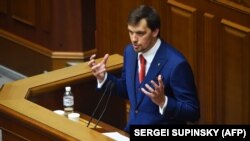In a final confirmation of Ukrainian President Volodymyr Zelenskiy’s hold on power, Ukraine’s parliament on August 29 confirmed the candidacy of presidential aide Oleskiy Honcharuk as prime minister.
President Zelenskiy’s 290-member Servant of the People faction was the only parliamentary faction that voted for the 35-year-old lawyer, who ranks as the youngest prime minister in the country's history. The faction’s votes later also carried the confirmation of Honcharuk’s proposed cabinet.
Analysts interviewed by Current Time before and after the vote reacted cautiously to Honcharuk’s candidacy, generally regarding it as “ideal” for the president’s own needs, but, still, given the prime minister’s lack of political experience, ultimately a toss-up.
Honcharuk, the presidential administration’s deputy head for economic policy issues, has no known political ambitions or supporters and is not known to have any ties to Ukrainian oligarchs – probably the first such prime minister to be without them, noted political analyst Oleg Saakyan.
As such, he presents little or no risk of becoming an eventual rival to Zelenskiy – an important consideration for a leader who, according to Saakyan, is “ruled by [considerations of] loyalty."
His background working as head of the Kyiv-based Better Regulation Delivery Office, a European-Union-financed consultancy for small and medium-sized businesses, and in real-estate development and business investment speaks to the president’s keen desire to boost Ukraine’s economy. Honcharuk previously also served as an advisor to First Deputy Prime Minister for Economic Development and Trade Stepan Kubiv, who oversaw Ukraine’s economic development, finance, and agriculture ministries under ex-President Petro Poroshenko.
Zelenskiy earlier had described Honcharuk as “an economic guru, who has never been in politics.” He called him “an independent, strong person, with a professional education, who is respected in Ukraine as well as the West.”
Yet Honcharuk is not known as “Zelenskiy’s person,” someone who has gone to school with the president or worked with him in show business, commented Saakyan.
Political analyst Konstantin Batovsky believes that the cabinet and deputy prime ministers will indicate how “independent” and “self-sufficient” Honcharuk actually will be.
Among them are several key figures:
Minister of Foreign Affairs - Vadim Prystaiko
Vadim Prystaiko has served since May as the deputy head of the presidential administration for foreign policy. Under ex-President Petro Poroshenko he represented Ukraine to the North Atlantic Treaty Organization and served for three years as deputy foreign minister.
He formerly has worked as Ukraine’s ambassador to Canada, deputy chief of mission in its embassy to the U.S., and as Ukrainian consul to Australia.
Minister of Defense – Ondriy Zagorodnyuk
Zagorodnyuk, a former volunteer soldier in the Donbas conflict zone, has served as a presidential advisor since July. He later became a member of the supervisory council of Ukroboronprom, a state-run defense-industry conglomerate.
Between 2015 and 2017, Zagorodnyuk ran the defense ministry’s Reform Project Office.
Director, Ukrainian Security Service – Ivan Bakanov
A childhood friend of Zelenskiy, Bakanov served as the president’s campaign manager and headed Servant of the People until this May. He formerly was the chief operating officer of Kvartal-95, the studio that produced Zelenskiy’s popular comedy TV series Servant of the People.
Minister of Economic Development, Trade, and Agriculture – Timofei Milovanov
A board member of the National Bank of Ukraine, economist Milovanov was ranked by Forbes Ukraine in 2015 as one of the country’s Top Economic Thinkers.
As president of the Kyiv School of Economics, he hosted a crash course this summer for Servant of the People deputies on policy issues they will need to understand in parliament.
Milovanov holds a Ph.D in economics from the University of Wisconsin-Madison.
Minister of Energy and Ecology – Oleksiy Orzhel
Orzhel co-founded the Ukrainian Association of Renewable Energy, a group of 15 Ukrainian companies that encourage development of hydro and solar energy, biogas, and wind power. Described by some Ukrainian media outlets as a relatively private person about whom little is known, Orzhel formerly worked with Honcharuk in the Better Regulation Delivery Office.
Interior Minister Arsen Avakov and Finance Minister Oksana Markarova, both holdovers from the Poroshenko administration, will remain in their posts.
Dmytro Kuleba, the head of Ukraine’s mission to the Council of Europe, was confirmed as deputy prime minister for European integration. Twenty-eight-year-old presidential aide Mykhailo Fedorov, founder of the digital ad agency SMMSTUDIO, will serve as deputy prime minister for digital policy, overseeing the president’s initiative to make government services more smartphone-friendly.
Servant of the People leader Dmytro Razumkov has been elected as parliamentary speaker.
Overall, these changes may suggest that Zelenskiy got what he wanted out of Ukraine’s new legislature when he called for early parliamentary elections this spring. But the toughest challenges may still lie ahead, cautioned political analyst Oleksiy Yakubin.
Now in control of both the presidency and parliament, Zelenskiy has little room for avoiding blame if policies go wrong or are not publicly embraced.
“[O]n one side, Volodymyr Zelenskiy is the victor and received everything, but he received everything within the context that he’s now responsible for everything," Yakubin said.
-With additional reporting by UNIAN





Facebook Forum